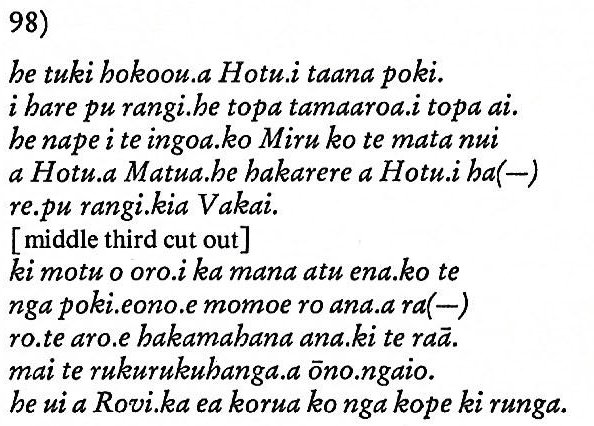
| he ea.a Vakai.he oho.he tuu.he
kakai |
Vakai arose, went away,
arrived, and quarreled with [he kakai kia]
Hotu in the following manner [penei
ē]: 'Why did
you shout [heaha.koe.e
rangi] bad things [te kī
rakerake] at King Tuu Maheke! This is how
it is [penei ē]
- King Tuu Maheke is not a bastard! [he
morore ō te ariki.a Tuu maheke]' |
| kia Hotu.penei
ē. heaha.koe.e rangi. |
| nei.i te kī
rakerake ki te ariki.kia Tuu ma(-) |
| heke.penei
ē.he morore ō te
ariki.a Tuu ma(-) |
| Kaka Kakaka (kaka).
Bark of banana-tree. Cut into strips, and left to
dry out, its fibres, hau kakaka, are used to
make small baskets, small bags etc. Vanaga. Samoa:
'a'asa, glowing hot. Tonga, Uvea: kakaha,
hot, fiery, painful. Futuna: kakā,
fiery, reddened by fire. Niuē: kakā,
hot, red-hot. Churchill 2.
Kakai. To
blame, to chide, to scold, to disapprove, to expel,
to reproach, to rebuke; debate, anger, dispute,
discussion, quarrel, reprehension, reprimand,
hostility; ivi kakai mai kakai atu,
an inharmonious family; kakai rae,
to provoke; kakai nuinui ke,
rage; toua kakai,
to rebuke. Mgv.: kaia,
wicked, cruel. Mq.: kaia,
envious, jealous, shrewish, quarrelsome, wrangling,
surly. Ta.: aia,
despicable. Churchill.
...Makoi replied, 'There are indeed all those
places. I did not forget them at all (? kai viri
kai viri) when I saw them (text corrected,
i-ui-nei). I alone saw no fewer than four of my
places, and I returned here only because night was
falling'. Then Ira spoke
again: 'How did you name them, last-born [hangupotu]?'
Makoi replied, 'This is what happened, this is how I
gave the names. I wrote (ta [?]) 'Te Manavai
A Hau Maka' on the surface of a banana leaf (kaka),
and this is how I left it'.
This is how Makoi remembered it.
No sooner had he said this, when
Ira grew angry and quarreled [he kakai] with
Makoi.
He said the following (to him): 'You did not pay
attention, last-born, and you did not [tae]
give the (full) name. This is how it should be [Penei]:
the Manavai of Hau Maka of Hiva, in memory (mo
aringa ora) of the father, of his dream
soul'. Makoi replied, 'In
Hiva the land belongs to him - the land here is
mine, not his [tae oona]!'
They stayed (there longer).
On the fifth day of the month of
July ('Anakena'), they all got up, went downhill [he
turu], went on, and reached Hanga Te Pau.
They took their provisions with them ... [E:21] |
| heke.he kī
atu e vakai.penei
ē. |
Vakai added: 'You
yourself are a bastard and a scabby head (puoko
havahava) of Tai A Mahia! |
| kokoe ana tau morore puoko.havahava.a |
| tai a Mahia.ko
kokiri tuu hongohongo.o
te hangai |
| Tahaga. Adverb:
without any particular reason, just like that.
Vanaga. 1. Only, solely, alone, wholly, without
stopping, always, quite, a sort of superlative;
noho tahaga, bachelor, keukeu tahaga, to
go without stopping; topa tahaga, quite
unexpected; puoa tahaga, always clad; nui
tahaga, to superabound; tatagi tahaga,
inconsolable; roaroa tahaga, middle finger
(the longest); tahaga no mai, a more
positively superlative statement. P Mgv.: tahaga,
only, alone, solely. Mq.: tahakahaka,
stripped of brushwood. 2. Irascible; tuhi tahaga,
to accuse, to calumniate. 3. (taha 2) A
sacrifice. Churchill. Pau. Tahaga, indecent.
Ta.: tahaa, naked. Mq.: tahanahana,
cleared, uncovered. Ma.: tahaga, naked.
Tahaki, the side. Sa.: tafa'i, one side.
Ma.: tahaki, one side. Mgv.: Tahaki, a
man with red hair and florid skin. Mq.: tahaki,
red. Ta.: Tahavahava, dirty, soiled. Ma.:
tahawahawa, to defile, to pollute. Churchill.
Vaha.
Hollow; opening; space between the fingers (vaha
rima); door cracks (vaha papare).
Vahavaha, to fight, to wrangle, to argue with
abusive words. Vanaga. 1. Space, before T; vaha
takitua, perineum. PS Mgv.: vaha, a
space, an open place. Mq.: vaha, separated,
not joined. Ta.: vaha, an opening. Sa.:
vasa, space, interval. To.: vaha,
vahaa, id. Fu.: vasa, vāsaà,
id. Niuē: vahā.
2. Muscle, tendon; vahavaha,
id. Vahahora
(vaha 1 -
hora 2),
spring. Vahatoga
(vaha 1 -
toga 1),
autumn. 3. Ta.: vahavaha,
to disdain, to dislike. Ha.: wahawaha,
to hate, to dislike. Churchill.
Kiri. Skin; bark; husk; kiri heuheu,
downy skin; kiri mohimohi (also kiri
magó), smooth hairless skin. Kirikiri miro,
multicoloured. Vanaga. Skin, hide, bark, surface;
kiri ekaeka, leprous; kiri haraoa, bran;
kiri hurihuri, negro; kiri maripu,
scrotum; kiri ure; prepuce. P Pau.: kiri,
bark. Mgv.: kiri, skin, bark, leather,
surface, color, hue. Ta.: iri, skin, bark,
leather, planking. Kirikiri, pebble, gravel,
rounded stone, sling stone; kikiri, pebble. P
Pau.: kirikiri, gravel, stony, pebbly. Mgv.:
kirikiri, gravel, small stones, shingle. Ta.:
iriiri, gravel, stony, rough. Kirikirimiro:
ragi kirikirimiro, sky dappled with clouds.
Kirikiriteu, soft gray tufa ground down with
sugar-cane juice and utilized as paint T.
Kiriputi (kiri - puti) cutaneous,
kiriputiti, id. Kirivae (kiri -
vae 1), shoe. Churchill.
Puoko.
1. Head; tagata puoko hiohio,
hard-headed, opinionated person. 2. Skull (also:
pakahera puoko). Vanaga. Head, skull, crown of a
hat; puoko garuru, headache; kiri puoko,
scalp. T. Mgv.: upoko, head (men or animals).
Mq.: upoko, upoó, head. Ta.: upoó,
human head. (Sa.: ulupo'o, skull. To.:
uluboko, id. Niuē:
ulupoko,
id.) Churchill. |
| i tuā.i
oti onge o hiva.ana kī
mai.a Taana. |
Kokiri Tuu Hongohongo
was your father (i.e., he raised your) back (i.e.,
in the west) in Oti Onge (literally, where the
hunger ends) in Hiva, because he was told to do so
by Taana A Harai!' |
| a Harai.he
hakahoki mai te ariki.a Hotu.i te |
|
... Antares, visible in the
morning sky of December-January, came to stand for
summer heat; hence the saying, 'Rehua cooks
(ripens) all fruit'. The generally accepted version
of the Rehua myth, according to Best, is that
Rehua had two wives, the stars on either side
of Antares. One was Ruhi-te-rangi or
Pekehawani, the personification of summer
languor (ruhi), the other Whaka-onge-kai,
She-who-makes-food-scarce before the new crops can
be harvested ...
|
ko oto uta |
ariki motongi |
1 |
Hamal (*0 → *30) |
|
ko tangaroa.a oto uta |
ariki motongi |
2 |
(*27 → *57) |
|
ko tiki hati.a tangaroa |
ariki motongi |
3 |
(*54 → *84) |
|
ko
roroi.a tiki hati |
ariki
motongi |
4 |
(*81
→ *111) |
|
ko tuu kumā.a roroi |
ariki motongi |
5 |
(*108 → *138) |
|
ko ataranga.a tuu kumā |
ariki motongi |
6 |
Alkes (*135 →*165) |
|
ko harai.a ataranga |
ariki motongi |
7 |
Bharani (*41) |
|
ko taana.a harai |
ariki motongi |
8 |
Aldebaran (*68) |
|
ko matua.a taana |
ariki motongi |
9 |
Canopus (*95) |
|
ko hotu.a matua |
ariki motongi |
10 |
Antares (*249) |
|
| kī.penei
ē. ai hoki koe.e
nua
ē. e tae ki ro |
To this speech King Hotu
answered [he hakahoki] the following
(analogous translation): 'Oh little mother, why did
you not tell me this in Hiva, in our homeland?' |
| mai era.i hiva ana.i tomatou
kainga |
|
Nua. 1.
Mother; this seems a more ancient word than
matu'a poreko. 2. Blanket, clothing, cape
formerly made from fibres of the mahute tree.
Vanaga. Cloak T. Churchill.
Nu'a 1.
Thick; piled one on top of the other, as
leis,
mats, or ocean swells; heaped; lush, thick-growing;
much traveled, as a road; multitude, as of people,
mass. Also hānu'a.
Moena kumu nu'a,
a sleeping mat made thick at one end to serve as a
head rest; lit. 'mat piled beginning'.
Nu'a
moena, a
heap of mats. Nu'a
kanaka, many people.
Haki nu'a ka uahi i
ke kai, the spray breaks in masses in the
sea. Ka nu'a o ka
palai, the thick clump of
palai
ferns. Ho'o nu'a,
to heap up; to give generously and continuously; to
indulge, as a child; surging, rising in swells, as
the sea. 2. A kind of seaweed. Nu'a-kea, a
goddess of lactation. Wehewehe. |
| era.he ea tau vie era he hoki he
oho |
The woman arose [he
ea tau vie era], turned around, went back to her
house, and stayed there. |
| ki toona hare.he noho. |
| he ea.a Hotu.he
neke.iti
atu.he
hakapehiva |
Hotu arose [he ea.a
Hotu], moved (his residence) a short distance
away [he neke.iti atu.he hakapehiva iti.ātu],
and settled down.
He finished building the house [he
āto.i toona hare] and covering the roof [he
oti te hare.te
ato], and now he lived in Hare Pu Rangi [he
noho.i hare pu rangi]. |
| iti.ātu.he
noho.he āto.i toona
hare.he oti te |
| hare.te
ato.he
noho.i hare pu rangi. |
|
...
The great stone statues (moai) 'walked' (he
nekeneke) to their proper places, i.e. they were
capable of moving as if by themselves
('automobiles') as if they had been nahe
plants (nehenehe, Angiopteris
evecta): ... I
remember from somewhere in Heyerdahl's books that he
considered it significant that neke-neke was
a special word in the vocabulary of Easter Island,
it meant 'walking without legs, walking by moving
the weight this side and that slowly advancing
forward'. He had discovered the word when he asked
how the statues had been moved - they walked (neke-neke)
was the answer
...
The plant was introduced by Captain Bligh from
Tahiti as a staple food for slaves and cultivated in
the Castleton Gardens in 1860. From there it was
able to distribute itself throughout the eastern
half of the island ...
Atu. Particle of meaning opposite to that
of mai; it refers to the second or third
person, expressing movement away: ka-avai-atu,
give it to him: he-oho-atu au, I am going
there, after you; i-oho-atu-era, when I had
gone there. Vanaga. 1. a. Directive, of motion from
the speaker. b. Somewhat expressive of the
comparative degree. 2. Pupil; hakaatu, proof;
hare hakaatuga, schoolhouse, class. 3. (hakaatu),
to presage. 4. (hakaatu), mark, object.
Churchill.
Pehi.
Mgv.: A ship. Mq.: pehi, a great canoe.
Churchill. Ta.: To assail with stones. Mq.: pehi,
id. Ha.: pehi, to throw stones at. Churchill.
To. 1.
Particle sometimes used with the article in ancient
legends; i uto to te hau, the ribbon was in
the float. 2. To rise (of the sun) during the
morning hours up to the zenith: he-to te raá.
Vanaga. 1. Of. T Pau., Ta.: to, of. Mgv.:
to, genitive sign. Mq.: to, of, for. 2.
This, which. Churchill. Mgv.: To, to make a
canoe of planks. Mq.: to, to build a canoe.
Sa.: to, to build. Churchill. |
|
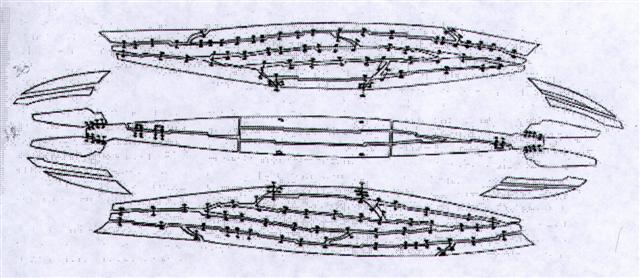 |
|
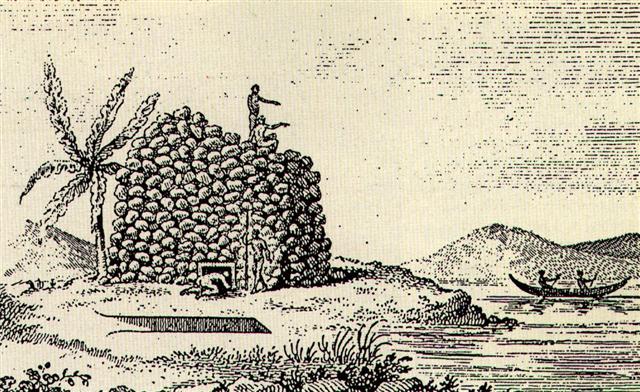 |
|
E:97 |
| he tuu ki te tahi.marama.he
ea.atu a Vakai |
When another month had
come [he tuu], Vakai set out again [he ea.atu a Vakai].
She went and entered into the house, into Hare Pu
Rangi [he
ōho.he oō ki roto ki hare pu rangi]. |
| he
ōho.he oō ki roto ki hare pu rangi.he no(-) |
| ho.i roto i te hare o te ariki.o
Hotu.ka noho |
She lived in the house
of King Hotu [he noho.i
roto i te hare o te ariki.o Hotu] while Tuu
Maheke stayed by himself [ka noho no.te ariki.a
Tuu maheke] in his own house [i toona hare
ana], in Hare Tupa Tuu, with his servant Rovi [i
hare tupa tuu.ko toona tuura tokoa.ko
Rovi]. |
| no.te ariki.a Tuu maheke. i toona
hare ana.i hare tu(-) |
| pa tuu.ko toona tuura tokoa.ko
Rovi. |
|
1½
lines of invented signs plus the name Vaka.a Tea
hiva
The
Eighth Land (p. 290): "one line of 'nonclassical'
signs (degenerated ta'u script or
self-composed graphemes). After another one-half
line, the sequence of numbers '1'´, '2', '30'. The
meaning of the sequence is not known."
1230 = 30 * 41. |
|
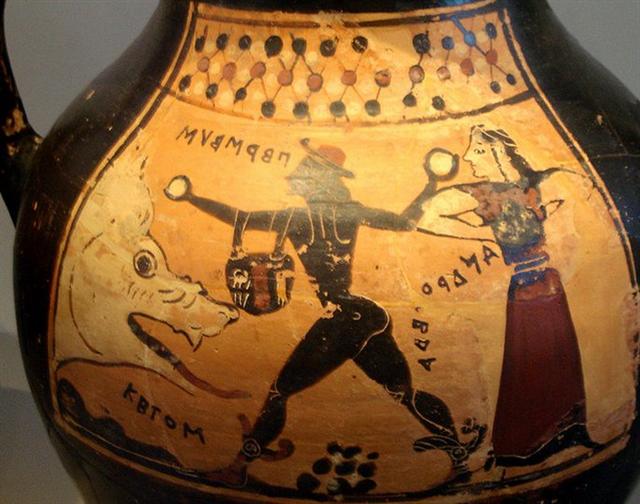 |
|
E:98 |
| he tuki hokoou.a Hotu.i taana
poki. |
Hotu begot another child in Hare Pu
Rangi. A boy was born [he topa
tamaaroa.i topa ai]. When he was born, he was given the
name Miru, the great eye (mata nui, wordplay 'great
tribe') of Hotu A Matua. Hotu left (the house)
Hare Pu Rangi to Vakai. [he hakarere a Hotu.i
hare.pu rangi.kia Vakai] |
| i hare pu rangi.he topa
tamaaroa.i topa ai. |
| he nape i te ingoa.ko Miru ko te
mata nui |
| a Hotu.a Matua.he hakarere a
Hotu.i ha() |
| re.pu rangi.kia Vakai. |
|
(middle third cut
out) |
[5 above + 5 middle + 5 below =
15] |
| ki motu o oro.i ka mana atu
ena.ko te |
At the moment when
(Rovi?) reached Motu O Roro (an islet off the
northern shore, east of Anakena), there were six
children lying with their faces down (i.e., on their
stomachs) [ko te nga poki.eono.e momoe ro ana.a
raro.te aro]; six youths were warming themselves
in the sun [e hakamahana ana.ki te raā]
after a lot of diving [te rukurukuhanga].
a ōno.ngaio = ao ono nga
io
- has not been translated by Barthel
Rovi asked [he ui a Rovi],
'Will you get up, fellows?' [ka ea korua ko nga
kope ki runga] |
| nga poki.eono.e momoe ro ana.a
ra(-) |
| ro.te aro.e hakamahana ana.ki te
raā. |
| mai te rukurukuhanga.a ōno.ngaio. |
| he ui a Rovi.ka ea korua ko nga
kope ki runga. |
|
Oro. 1. To
flit in the air (of a bird), turning and flying up
and down. 2. To file, to scratch, to scrub, to
grind, to sharpen; ka-oro te kumara, grind
the sweet potatoes; ka-oro te hoe, sharpen
the knife. Orooro, to rub, to polish, to
shine. Vanaga.
Oroina, to choke on a fish bone.
Orooro, to
whet, to sharpen (horo).
Churchill. Mahana. 1. Tepid, lukewarm,
warm; vai mahana, warm water. 2. To stop
raining; he-mahana te ûa, the rain has
stopped. Vanaga. 1. Heat, hot (maana, hana,
pumahana); mahana ke, suffocating;
mahana nui, stifling; mahana no iti,
lukewarm; vera mahana, hot; hakamahana,
to heat, to scald, to warm over. 2. Finery.
Churchill.
Ruku.
(Also rukuruku): To dive; to fish underwater;
diving; i-turu-era au ki tai, he-ûi koai te
tagata era, e-ruku-mai-era i te îka, i te ura,
as I went down to the sea, I saw who those people
were, who were fishing underwater for fish and
lobsters. Vanaga. To bathe, to immerse, to swim face
down, to dive, to leap into the water from a height.
Hakaruku, to cover with water, to immerse, to
submerge, to moisten, to wash, to drink. P Mgv.:
ruku, to dive, to plunge. Mq.: úku, to
dive, to immerse. Churchill.
Ao. Large dance paddle. 1. Command, power,
mandate, reign: tagata ao, person in power,
in command, ruler. 2. Dusk, nightfall. 3. Ao nui,
midnight. 4. Ao popohaga, the hours
between midnight and dawn. Aô, to serve
(food); ku-âo-á te kai i ruga i te kokohu,
the food is served on a platter. Vanaga. 1.
Authority, kingdom, dignity, government, reign (aho);
topa kia ia te ao, reign; hakatopa ki te
ao, to confer rank; ao ariki, royalty;
ka tu tokoe aho, thy kingdom come. PS Mgv.:
ao, government, reign. Mq.: ao,
government, reign, command. Sa.: ao, a title
of chiefly dignity; aoao, excellent,
surpassing, supreme. 2. Spoon; ao oone,
shovel. 3. Dancing club T. 3. Aonui (ao-nui
2), midnight. 4. Pau.: ao, the world. Mgv.:
ao, id. Ta.: ao, id. Mq.: aomaama,
id. Ma.: ao, id. 5. Pau.: ao, happy,
prosperity. Mgv.: ao, tranquil conscience.
Ta.: ao, happiness. 6. Mgv.: ao,
cloud, mist. Ta.: ao, id. Mq.: ao, id.
Sa.: ao, cloud. Ma.: ao, id. 7. Mgv.:
ao, hibiscus. 8. Ta.: ao, day. Mq.:
ao, day from dawn to dark. Sa.: ao, id.
Ma.: ao, id. 9. Ta.: ao, a bird. Ha.:
ao, id. 10. Mq.: ao, respiration,
breath. Ha.: aho, breath. 11. Mq.: ao,
to collect with hand or net. Sa.: ao, to
gather. Ma.: ao, to collect. Ta.: aoaia,
to collect food and other things with care.
Churchill.
Io. Mgv.: At the house of. Ta.: io,
id. Mq.: io, id. Aka-ioio, feeble,
lean and thin. Mq.: hakaioio, to be wrinkled,
flabby flesh of the aged. Churchill. |
|
...
Io
dwelt within the breathing-space of immensity. //
The universe was in darkness, with water everywhere.
// There was no glimmer of dawn, no clearness, no
light. And he began by saying these words,
That he might cease remaining
inactive:
'Darkness, become a
light-possessing darkness.' And at once a light
appeared. He then repeated these self-same words in
this manner,
That he might cease remaining inactive:
'Light, become a
darkness-possessing light.' And again an intense
darkness supervened. Then a third time He spake,
saying:
'Let there be one darkness above. Let there be one
darkness below. Let there be a darkness unto
Tupua. Let there be a darkness unto Tawhito.
A dominion of light. A bright light.' And now a
great light prevailed.
Io
then looked to the waters which compassed him about,
and spake a fourth time, saying:
'Ye
waters of Tai kama, be ye separate. Heaven be
formed.' Then the sky became suspended.
'Bring forth thou Te Tupua horo nuku.' And at
once the moving earth lay stretched abroad.
(Tiwai Paraone, New
Zealand, c. 1880, and translated by Hare Hongi.)
More than fifty years after
Christianity reached New Zealand it was suddenly
disclosed by certain Maori elders that the
pantheistic mythology hitherto revealed was not in
fact the full story, and that according to an
esoteric or 'higher' learning - withheld till then
because of its sanctity - the Maori did have a
single, Supreme Creator, whose name was Io.
The first reference in
print to Io seems to have been made in 1876,
by C. O. Davis, who said a member of the Ngapuhi
tribe had told him 'that the Maoris in olden times
had worshipped a Supreme Being whose name was so
sacred that none but a priest might utter it at
certain times and places ... The only complete
account was given much later, in a manuscript
dictated by the Maori elder Te Matorohanga
and published in 1913 ... But both this elder and
his scribe Te Whatahoro were converted
to Christianity long before the manuscript was
composed.
The little word 'io' or 'kio', as Buck
points out in an amused survey of the principal
evidence and claims ... can sometimes mean the
squeak of a rat or bird, at other times muscular
twitches of the body that were regarded as omens by
the Maori. Even so, Io-Jehovah caused some
excitement in an age which wished to persuade itself
that primitive peoples had really been Believers all
along, and His revelation soon led to further
discoveries elsewhere in Polynesia - notably in the
Tuamotu, where Stimson believed as late as
1933 that he had unearthed a cult of 'Kiho'.
(Antony Alpers, Legends of the South Seas.) |
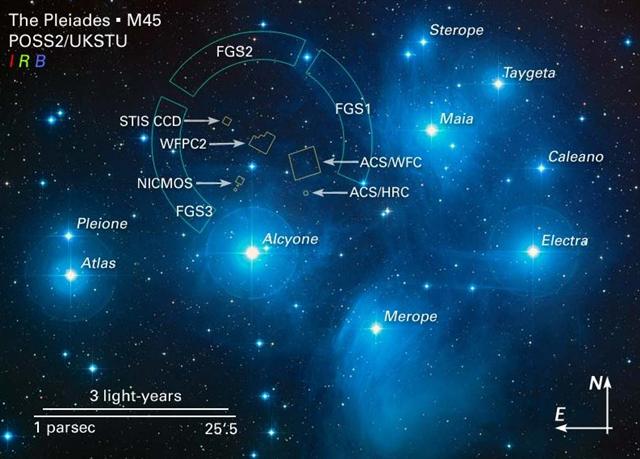
|